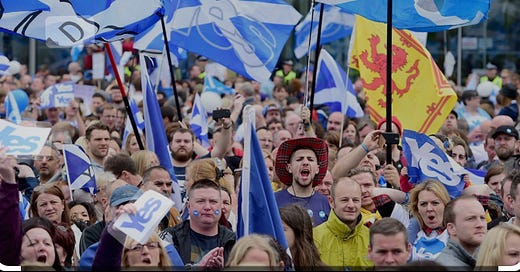Whatever happened to Scottish independence?
50% of Scots still say they want to break up Britain, so why does no one believe it’ll happen?
It was amusing to see the progressive ministers in the Scottish National Party, like Mairi McAllan and Shirley-Anne Somerville, lining up behind a middle-aged white male, John Swinney, for the SNP leadership rather than a young woman, Kate Forbes. They’d rather restore the glass ceiling than have a woman whose views aren’t sufficiently “woke”.
Not that anyone could describe the 60-year-old John Swinney as woke. He is the image of the centrist dad - with a whiff of Presbyterianism. Stoic, “moderate”, a man Perthshire farmers can do business with - as well as the oil and gas industry. No radical firebrand he is the personification of safety first, the safe pair of hands, a safe space, indeed, for nationalist politics.
He made clear in his campaign launch - his coronation doesn’t happen till next week - that under his watch, the SNP will be going for economic growth rather than the wellbeing economy that the anti-growth Greens promoted. Nor are climate change targets sacrosanct. “The pursuit of net zero,” he said in his Bute House address, “has to take people and business with us”. That means the SNP will not be ordering Scots to remove their gas central heating boilers any time soon. The Green Party ministers had already accepted the scrapping of interim emissions targets when they were part of the Scottish government. Gender Recognition Reform Bill - just don’t ask.
As for independence, which will, of course, be “front and centre” of Team Swinney’s agenda, he gave no indication of how the Scottish government is going to break the deadlock. There was no mention of court actions, de facto referendums, or any of the gimmicks of the Sturgeon era. Indyref 2, as it used to be called, isn’t going to happen any time soon. As everyone and his dog points out, the last time John Swinney led the SNP, he took it to 20% in the 2003 EU elections. In the 2004 general election, the SNP returned only six seats against Labour’s 41.
So what exactly are the prospects now for the cause that has dominated Scottish politics for the last decade? Here’s my assessment.
Keep reading with a 7-day free trial
Subscribe to Iain Macwhirter's Substack to keep reading this post and get 7 days of free access to the full post archives.




